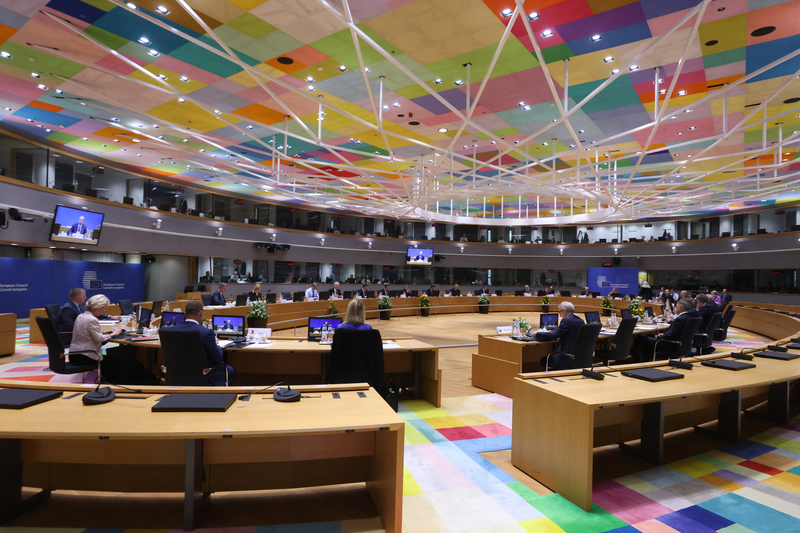On the first day of the European Council summit on Thursday, EU leaders adopted conclusions on the war in the Middle East and on the multiannual financial framework 2021-2027.
Over the course of the summit, the leaders will also discuss continued support for Ukraine, boosting long-term economic growth in the EU, migration and external relations.
The Israel-Gaza war was no doubt the most urgent issue on the agenda in view of the rapidly deteriorating humanitarian situation in Gaza. Israel has launched massive air strikes against Hamas targets in the Gaza Strip after its terrorist attack on 7 October and continued indiscriminate rocket attacks across Israel.
The European Council conclusions are described as a follow-up of the previous statement on 15 October which expressed the EU’s common position. In the new conclusions, the Council reaffirmed its condemnation of Hamas’ brutal attack and emphasized Israel’s right to defend itself in line with international law and international humanitarian law.
For the first time, the EU added that “the use of civilians as human shields by Hamas is a particularly deplorable atrocity”. It reiterated its call on Hamas to “immediately release all hostages without any precondition”.
The Council also reiterated the importance of ensuring the protection of all civilians at all times in line with international humanitarian law and deplored all loss of civilian life. It calls for “continued, rapid, safe and unhindered humanitarian access and aid to reach those in need through all necessary measures including humanitarian corridors and pauses for humanitarian needs.”
Hamas has until now released four hostages. There are reports about talks via Qatar about a further release or larger prisoner exchange. For that Hamas is reportedly demanding that Israel resumes its supply of fuel to Gaza and agrees to a cease fire. Israel allows the delivery of humanitarian aid (water, food and medical equipment) but not fuel from Egypt via the Rafah border crossing in the south.
Fuel is needed to keep hospitals and power plants running in the Gaza Strip. Israel says that fuel might be diverted to Hamas, which already has seized fuel belonging to UNRWA, (the UN aid agency for the Palestinian refugees), to maintain its military capacity and continue the war.
Israel is also preparing a ground invasion into Gaza to take down Hamas and destroy its military capacity and infrastructure. The impending offensive has been delayed for different reasons, the most important one to allow for a release of the over 200 hostages, among them children, women and elderly people, taken hostages by Hamas during its raid into Israel.
A ground offensive will become an urban war in a densely populated area where Hamas has built up its military infrastructure close to civilian buildings, including schools and hospitals, and fortified itself in tunnels under Gaza city. Most of the civilian population in the north of Gaza has already moved to the south for its own safety but hundreds of thousands are still left there and are prevented by Hamas from leaving.
From the very start, the Israeli government and military experts warned that a ground offensive will take weeks or even months. Other experts have cautioned and said it should be limited in time or even postponed to another time at Israel’s own choice. Hamas could also be weakened and eventually removed from ruling the Gaza Strip by denying it support from other countries.
During his visit in Israel this week, France’s President Macron proposed an international coalition against Hamas similar to the coalition which defeated ISIS. Such a coalition would include the US, the EU and moderate Arab countries but probably lack the support of the United Nations Security Council, where Russia and China have called for a cease-fire without condemning Hamas and recognizing Israel's right to self-defense.
Besides repeating the overall goals of the war - defeating Hamas and destroying its military capacity - the Israeli government has not defined a clear exit strategy and been silent on the political aftermath once the war is over and Hamas had been defeated.
In its conclusions, the EU says that it is ready to contribute to reviving a political process on the basis of the two-state solution, including through the Peace Day Effort, and welcomes diplomatic peace and security initiatives and supports the holding of an international peace conference soon.
As previously reported, the Peace Day Effort was a meeting on the sidelines of the UN General Assembly last September. It was launched by the EU together with Saudi Arabia and other Arab countries to reinvigorate the peace process in the Middle East. The Hamas attack on 7 October was planned a year in advance but aimed at disrupting any peace process and peace between Israel and the Palestinians, and other Arab countries.
M. Apelblat
The Brussels Times

